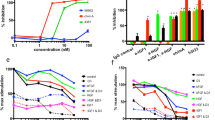Abstract
The type I insulin-like growth factor receptor (IGF-IR) plays an important role in the growth and transformation of breast cancer cells. In this study, we investigated the effects of treatment with an antisense IGF-IR construct on cells from the highly metastatic estrogen receptor-negative human breast cancer cell line MDA-MB-435s. The cells carrying the antisense IGF-IR had a markedly reduced expression of IGF-IR, had a significant decrease in cell proliferation, and lost the ability to form colonies in soft agar. There was a delay in tumor formation and a dramatic reduction in tumor size when cells carrying the antisense IGF-IR were injected into either nude or severe combined immunodeficient (scid) beige mice. We have also provided data that show that the scid beige mouse is a more suitable model for studying metastasis of the MDA-MB-435s cells. All of the scid beige mice injected with cells carrying the control construct had metastasis to the lungs, whereas lungs from the nude mice had no apparent metastatic sites after 11 weeks. When cells carrying antisense IGF-IR were injected subcutaneously in scid beige mice, the animals had a significant increase in survival compared with mice injected with cells carrying the control construct. Taken together, these results indicate that the IGF-IR can play a critical role in the progression of breast cancer. Our studies provide a basis for the development of future treatment strategies targeting the IGF-IR in metastatic breast cancer.
This is a preview of subscription content, access via your institution
Access options
Subscribe to this journal
Receive 12 print issues and online access
$259.00 per year
only $21.58 per issue
Buy this article
- Purchase on Springer Link
- Instant access to full article PDF
Prices may be subject to local taxes which are calculated during checkout
Similar content being viewed by others
Author information
Authors and Affiliations
Rights and permissions
About this article
Cite this article
Chernicky, C., Yi, L., Tan, H. et al. Treatment of human breast cancer cells with antisense RNA to the type I insulin-like growth factor receptor inhibits cell growth, suppresses tumorigenesis, alters the metastatic potential, and prolongs survival in vivo. Cancer Gene Ther 7, 384–395 (2000). https://doi.org/10.1038/sj.cgt.7700126
Received:
Accepted:
Published:
Issue Date:
DOI: https://doi.org/10.1038/sj.cgt.7700126
Keywords
This article is cited by
-
Mammary tumors that become independent of the type I insulin-like growth factor receptor express elevated levels of platelet-derived growth factor receptors
BMC Cancer (2011)
-
ErbB2 enhances mammary tumorigenesis, oncogene-independent recurrence and metastasis in a model of IGF-IR-mediated mammary tumorigenesis
Molecular Cancer (2010)
-
Effect of type 1 insulin-like growth factor receptor targeted therapy on chemotherapy in human cancer and the mechanisms involved
Journal of Cancer Research and Clinical Oncology (2010)
-
Downregulation of IGF-IR expression by RNAi inhibits proliferation and enhances chemosensitization of human colon cancer cells
International Journal of Colorectal Disease (2010)
-
Reversibility and recurrence of IGF-IR-induced mammary tumors
Oncogene (2009)



